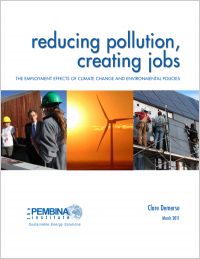If you spend time listening to politicians talk about their priorities, you'll very quickly end up hearing about jobs. Job creation matters across the country, and its importance has only grown in response to the economic downturn. We all know that decision-makers are eager to take steps that create jobs, and they think very carefully before putting a policy in place if it could lead to job losses.
For our climate team, this added up to a powerful case to study green employment.
We published the results of that analysis today in a new report called Reducing Pollution, Creating Jobs, which reviews green job literature from Canadian and international studies. We concluded that the kinds of policies we need to tackle climate change could employ even more Canadians than "business as usual." In other words, cutting greenhouse gas pollution can be good news for both workers and the environment.
 For example, numerous studies show that renewable electricity, like solar and wind, generates more jobs per dollar invested than fossil fuel electricity. Using a 2009 Ontario assessment, we estimated that the federal government's economic stimulus funding for infrastructure could have created nearly three times as many jobs if it had been invested entirely in clean energy.
For example, numerous studies show that renewable electricity, like solar and wind, generates more jobs per dollar invested than fossil fuel electricity. Using a 2009 Ontario assessment, we estimated that the federal government's economic stimulus funding for infrastructure could have created nearly three times as many jobs if it had been invested entirely in clean energy.
Oil and gas extraction is the most capital intensive sector in Canada. Because sectors that spend more on capital spend proportionately less on labour, investing public dollars in virtually any other area of Canada's economy would yield more jobs per dollar than oil and gas extraction.
Many other countries are putting in place policies aimed at making them winners in the global competition for clean energy jobs. Canada has not kept pace, and we risk missing out on significant manufacturing and export opportunities as a result. In 2009, none of the world's top 10 solar cell manufacturers or the world's top 10 wind turbine manufacturers were based in Canada.
We're not the only ones who have come to the conclusion that green jobs are worth understanding and preparing for. Using Access to Information legislation, we learned that Human Resources and Skills Development Canada (HRSDC), the federal department responsible for labour market programs, has started a green jobs research program of its own. (The documents we obtained through Access to Information requests are available online as an appendix to our report.)
For example, a September 2009 briefing note to Minister Diane Finley requested approximately $55,000 to support a policy project at the Organisation for Economic Co-operation and Development (OECD) entitled The Jobs Potential of Shifts Towards a Low-Carbon Economy. The department recommended supporting the first phase of this research because the "results of this project will help policy development in Canada as we continue to study the impact of the low-carbon economy in a Canadian context." The note adds that green investments "could provide Canada with opportunities for economic growth and the creation of quality jobs (innovative, environmentally sustainable)."
 We couldn't agree more. Not only could climate policies create good new jobs, but they can create them across the country. For example, construction workers doing energy efficiency upgrades can work anywhere in Canada where there are homes, offices and commercial buildings. And Canada's coasts, sunny prairies, manufacturing regions and even the far North — each region has good potential for different kinds of low-impact renewable energy.
We couldn't agree more. Not only could climate policies create good new jobs, but they can create them across the country. For example, construction workers doing energy efficiency upgrades can work anywhere in Canada where there are homes, offices and commercial buildings. And Canada's coasts, sunny prairies, manufacturing regions and even the far North — each region has good potential for different kinds of low-impact renewable energy.
So if the government wants to make the right choices for Canadian workers and the environment, the 2011 budget won't see the end of popular and effective clean energy programs. Instead, a green jobs budget would cut fossil fuel subsidies and offer strong new support for clean energy and energy efficiency.
Many of Canada's peer countries — and some of Canada's provinces — already understand the job opportunities that climate-friendly policies offer, and are putting the policies in place to capture them. We'll be watching to see whether Prime Minister Harper and Finance Minister Flaherty are finally ready to do the same.
Clare Demerse was the director of federal policy at the Pembina Institute until 2014.



